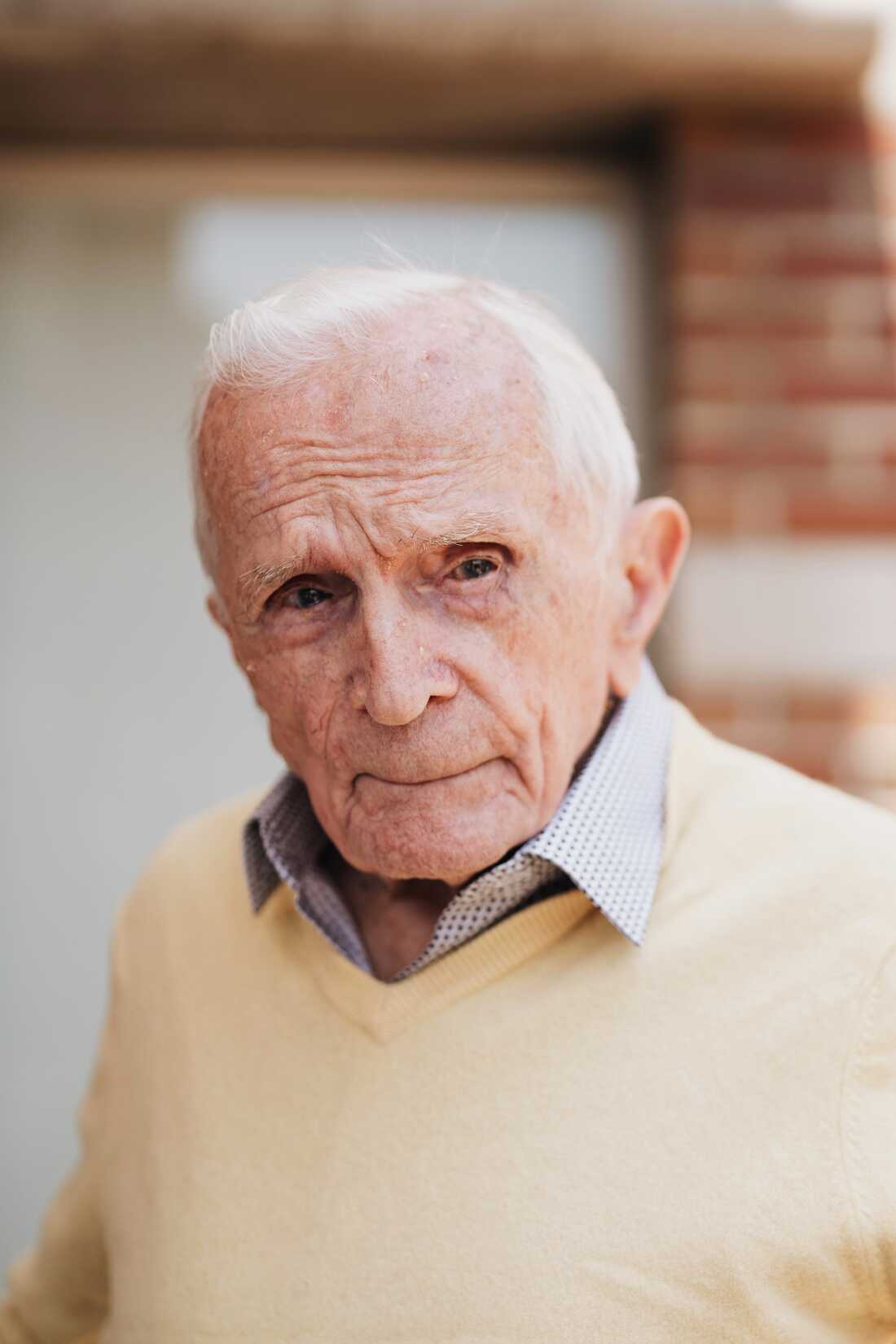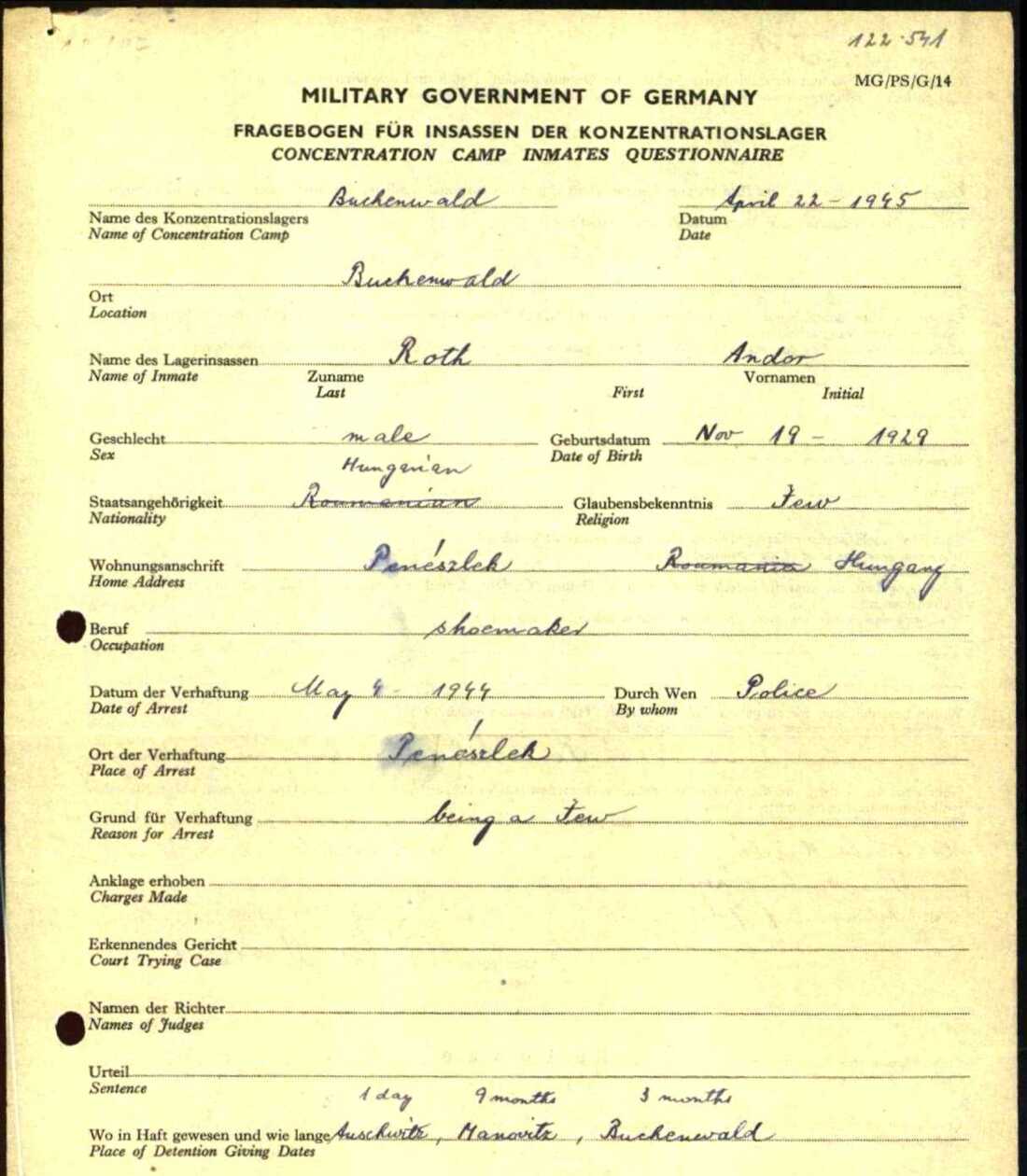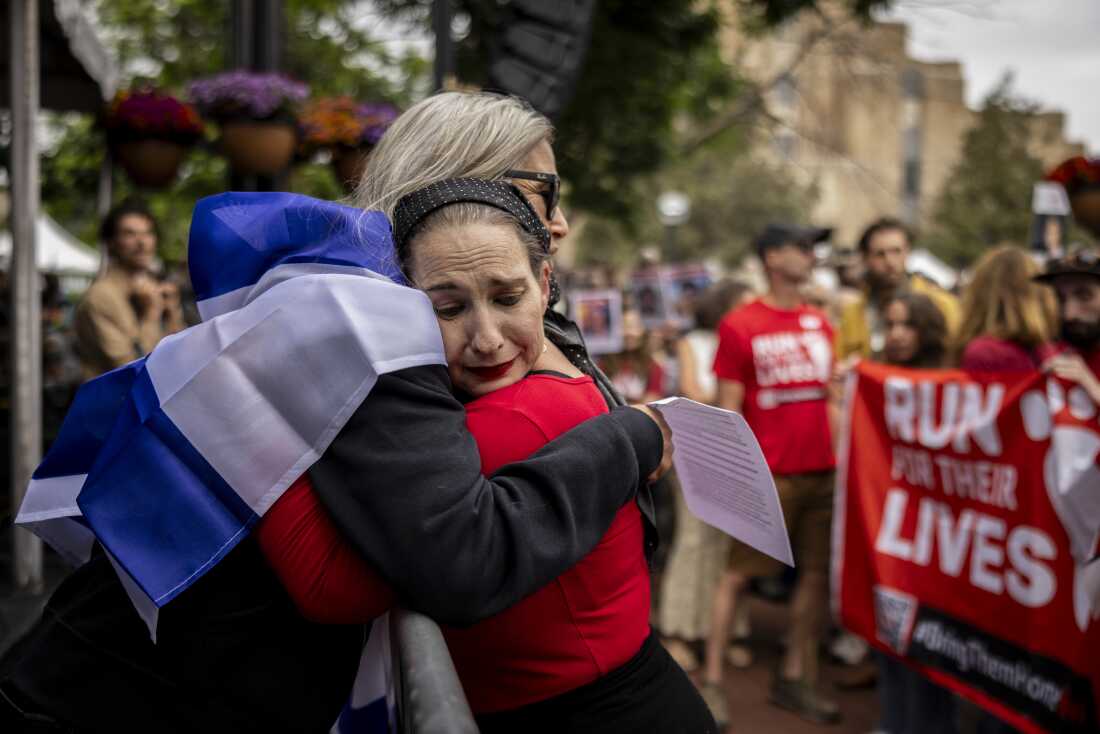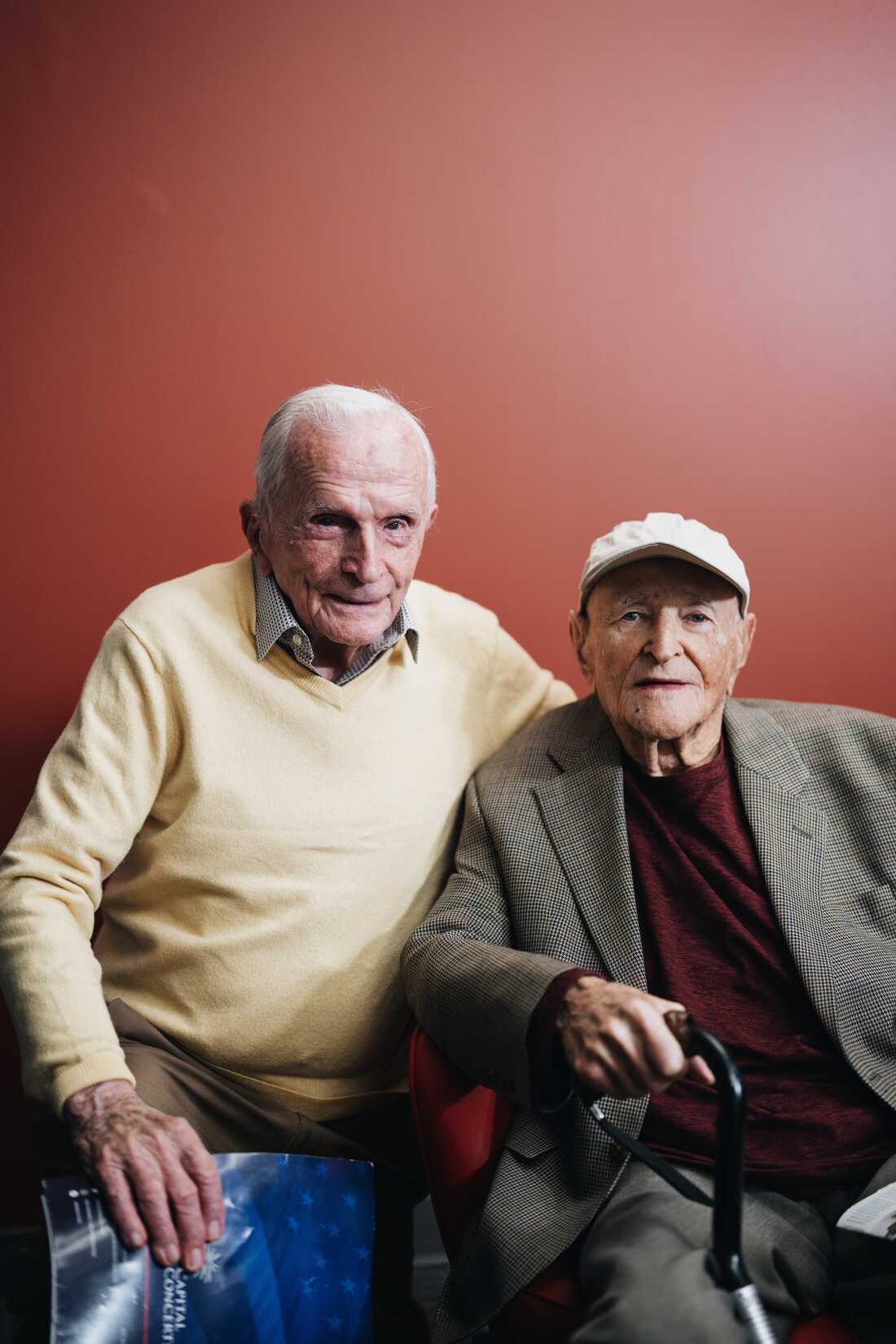Andrew Roth (left) stands up from his wheelchair to offer Jack Moran a hug on the Shoah Basis on the College of Southern California in Los Angeles. Roth was imprisoned within the Buchenwald focus camp, which Moran helped liberate whereas serving within the U.S. Military.
Grace Widyatmadja/for NPR
cover caption
toggle caption
Grace Widyatmadja/for NPR
Jack Moran was born in Superior, Wisconsin, in 1925.
Andrew Roth was born on the opposite aspect of the world, in Penészlek, Hungary, in 1927. Earlier this month, the 2 males met in Los Angeles. It was not the primary time that occasions had introduced them to the identical place.
“Are you the soldier who…” Roth requested from his wheelchair, reaching his hand out.

“You do not have to rise up,” mentioned Moran.
Roth leaned on his cane, and stood. The 2 males embraced.
“I used to be a lot youthful,” mentioned Roth. “So have been you.”
“How great that you simply survived,” mentioned Moran.
Eight a long time earlier, Roth was a prisoner within the Buchenwald focus camp in Germany, having already survived the Auschwitz dying camp and, earlier than that, a ghetto for Jap European Jews.
Moran was serving within the U.S. Military, when he arrived with the American navy and helped liberate Buchenwald, after dealing with the brutal fight of the Battle of the Bulge, the place he watched his finest pals die.
Each males have been nonetheless youngsters once they endured devastating Nazi atrocities and the horrors of conflict.

Andrew Roth and his household have been deported from Hungary and brought to Auschwitz-Birkenau, the place most of his household have been murdered within the fuel chambers.
Grace Widyatmadja for NPR
cover caption
toggle caption
Grace Widyatmadja for NPR
Now, each approaching 100 years outdated, Roth and Moran met to share their tales with the USC Shoah Basis, which maintains the most important audiovisual archive of Holocaust survivor and witness testimonies.
The Nazis systematically killed an estimated six million Jews within the Holocaust. Immediately, simply over 220,000 Holocaust survivors stay worldwide, in response to the Convention on Jewish Materials Claims Towards Germany, a company that helps survivors obtain compensation for Nazi atrocities.
Fewer and fewer first-hand witnesses stay alive to inform their tales, and the remaining survivors’ reminiscences are fading. The USC Shoah Basis is racing in opposition to time to assemble these testimonies, uncover extra Holocaust historical past, and enhance world understanding of the genocide.
“There are so few of the best era or the survivor era who’re nonetheless with us,” mentioned Rob Williams, a Holocaust historian and CEO of the USC Shoah Basis.
Williams mentioned that although the Holocaust has been the topic of intense historic curiosity over time, many components of that historical past, notably in Jap Europe, stay unexplored or unknown.
The testimonies of remaining survivors might help fill within the gaps.
“And if we’re unable to not solely document their tales, however share them with the world,” Williams mentioned, “there are elements of this historical past or alternatives to construct connections that will endlessly be misplaced.”
‘Life was so low cost and dying got here really easy’
Moran enlisted within the Military at 17 years outdated, and deployed to the battlefields of western Europe in 1944. A long time later, what’s most vivid in his reminiscence is the overwhelming loss he and his fellow troopers endured.
“I noticed so many good younger fellows laying within the ditches of France, and within the snow of Belgium, and within the woods of Germany,” Moran mentioned. “19 years outdated, 20 years outdated, their lives minimize quick.”

Jack Moran was caught in a foxhole for days with out meals in the course of the Battle of the Bulge.
Grace Widyatmadja for NPR
cover caption
toggle caption
Grace Widyatmadja for NPR
In a single battle, he misplaced 4 of his finest pals.
“God spared me for some purpose,” he mentioned. “Life was so low cost, and dying got here really easy. It was so, so unhappy.”
Through the brutal winter of 1944-1945, in the course of the Nazi offensive often known as the Battle of the Bulge, Moran mentioned he was caught for days in a frozen foxhole, surrounded by the German navy, with no meals.
“Thank God the snow was there to offer us water,” Moran mentioned.
Every survival was adopted by one other battle, and increasingly more preventing.
“I noticed grown males — 25 years outdated was a grown man to me at the moment — after a battle, sitting within the nook of a barn, crying like a child, saying ‘I am unable to take this anymore. I am unable to stand this anymore,'” Moran mentioned. “And I felt the identical method. All of us did. However we needed to proceed. We had no alternative however to maintain going ahead, watching our pals die.”

U.S. Military troops march via Belgium on Jan. 25, 1945, in the course of the Battle of the Bulge.
AP
cover caption
toggle caption
AP
Because the Military superior into Germany, Moran started seeing indicators of one other form of horror.
“In railroad yards, we discovered boxcars,” Moran mentioned. “We would open up the door and inside can be six or seven-hundred suitcases that the house owners by no means obtained again.”
All through the Holocaust, the Nazis confiscated the belongings of Jewish folks — who, in the event that they weren’t instantly killed, have been deported to ghettos and focus camps — and used them for the German conflict effort. Focus camp guards even shaved inmates’ hair, which was then repurposed as insulation or uncooked materials for German navy provides.
‘I used to be simply very resourceful, and really fortunate’
In 1944, the Nazis forcibly took Andrew Roth and his Orthodox Jewish household from their small Hungarian city to a ghetto in Satu-Mare, now a part of Romania.
All through the Holocaust, the Nazis concentrated European Jews in city ghettos, which have been marked by horrific dwelling circumstances, pressured labor and the specter of execution.
Life within the ghetto didn’t final lengthy.
Later that yr, Roth and his household have been deported to Auschwitz, the Nazi focus camp in Poland, which was outfitted with fuel chambers to commit homicide on an industrial scale. Round a million Jews have been killed at Auschwitz over the course of the Holocaust.
When Roth and his household obtained to Auschwitz, he recollects, the focus camp guard was separating new arrivals into two traces.
“Rechts” and “hyperlinks,” Roth recollects the guard telling them — sending folks both “proper” or “left.”
“He instructed me to go rechts,” Roth mentioned, to observe his mom and siblings. However he noticed his uncle and a cousin going to the left.
“With out considering,” he mentioned, he determined to observe his uncle, “not realizing that I made a life and dying alternative. All those that went to the suitable have been gassed the identical evening. And I went with my uncle the opposite method. And right here I’m.”
With most of his household murdered, Roth survived on minimal rations within the chilly, whereas performing laborious labor. Loss of life was a continuing presence.
“It was so routine, you simply get proof against that stuff,” Roth mentioned.
Because the Soviet military approached Auschwitz, the Nazis despatched Roth and different inmates to Buchenwald, a focus camp in Germany.

Younger, emaciated prisoners stand contained in the barbed wire of the Buchenwald focus camp on April 19, 1945, shortly after the U.S. military liberated the camp from the Nazis.
Byron Rollins/AP
cover caption
toggle caption
Byron Rollins/AP
In his block was one other teenager — Elie Wiesel — who would go on to write down about his expertise within the Holocaust within the memoir Evening and later acquired the Nobel Peace Prize. Wiesel died in 2016.
Roth mentioned survival usually boiled right down to a struggle in opposition to freezing chilly and hunger. At one level, he recollects discovering the place the Nazis fed the German Shepherds used to protect the camp. He risked his life to take simply sufficient pet food to stay alive.
“I used to be simply very resourceful,” Roth mentioned, “and really fortunate more often than not.”
‘I could not consider what I used to be seeing’
By April 1945, because the Nazi regime was collapsing, destiny introduced Roth and Moran collectively.
On April 11, inmates started to overhaul the camp because the guards fled. U.S. forces arrived quickly after and liberated the realm. 21,000 inmates remained. 900 of them have been youngsters.
Roth mentioned the expertise of liberation was “unreal, unbelievable.”
Although he was born in September, he now celebrates April 11 as his birthday.
“I could not consider what I used to be seeing — how man can appear so imply to his fellow human being,” mentioned Moran.

Andrew Roth’s official questionnaire, accomplished after the U.S. Military liberated Buchenwald, a Nazi focus camp in Germany. Roth was given the identify “Andor” at delivery, and later adopted the identify Andrew.
Andrew Roth/U.S. Navy Authorities of Germany
cover caption
toggle caption
Andrew Roth/U.S. Navy Authorities of Germany
Common Dwight D. Eisenhower, the Supreme Commander of the Allied Forces in Europe, invited members of Congress and journalists to go to the liberated camps, together with Buchenwald, to witness firsthand the proof of Nazi atrocities.
Roth mentioned he remembers talking to Germans shortly after liberation who claimed ignorance.
“They stored saying, ‘wir haben das nicht gewusst,'” Roth mentioned, which means, “we didn’t know.”
“It was a blatant lie,” Roth mentioned. “There was no method of ignoring it.” He mentioned that when the Nazis burned the our bodies of their victims, the smoke and the scent traveled for miles.
The struggle to protect historical past
“By and enormous, data of the Holocaust is reducing,” mentioned Williams, who beforehand labored for the U.S. Holocaust Memorial Museum, “even in a number of the international locations answerable for the crimes of the Holocaust.”
Understanding the Holocaust, he argues, is essential to understanding the trendy world, together with the postwar establishments designed to make sure that “by no means once more” wouldn’t be an empty promise.
Worldwide organizations just like the United Nations and NATO have been created within the aftermath of World Conflict II, and worldwide treaties on the remedy of refugees and in opposition to genocide have been ratified. The phrase “genocide” didn’t exist earlier than World Conflict II.

Skepticism of such establishments of worldwide cooperation have gained political traction. Authoritarian governments, resembling Viktor Orban’s in Hungary, have gained energy and undermined civil liberties. In Germany, leaders of the far-right political occasion Alternativ für Deutschland (Different for Germany), or AfD, have decried what they name a “cult of guilt” across the Holocaust, and questioned the nation’s continued reckoning with Nazi-era crimes. Within the U.S., members of the Trump administration, together with Vice President JD Vance and Secretary of State Marco Rubio, have expressed help for the AfD.
“I hate to be pessimistic, however I do not assume it is any coincidence that simply as we’re casting doubt on the worth of democracy or on the worth of human rights,” Williams mentioned, “that we’re additionally starting to witness a decline in understanding and reminiscence of the Holocaust.”

Within the U.S., violent antisemitic assaults have occurred in Boulder, Colo., and Washington, D.C. Common on-line influencers with thousands and thousands of followers have inspired Holocaust denial. And a number of members of the Trump Administration have promoted antisemitic conspiracies and related to antisemitic extremists.

Two members of a company devoted to displaying solidarity with hostages held in Gaza embrace at a vigil, one week after an antisemitic assault on the group in Boulder, Colo.
Chet Unusual/Getty Photos
cover caption
toggle caption
Chet Unusual/Getty Photos
Discovering which means out of horror
After the conflict, Roth initially moved to France earlier than settling in the US.
Moran returned to Wisconsin after the Allied victory in Europe, and braced for a attainable deployment to the Pacific. When information of Japan’s give up came visiting the radio, he sobbed with reduction.
Each males settled in California and began households. They nonetheless carry their tales of the conflict.
The method of gathering oral histories, Williams mentioned, is not simply invaluable for historians, however is significant for the survivors as nicely.
Moran mentioned he was moved by his assembly with Roth.
“That anyone survives these camps is an excellent factor,” Moran mentioned. “And I am so pleased to fulfill him.”

Jack Moran (left) was among the many U.S. Military troopers who helped liberate Buchenwald, whereas Andrew Roth was a survivor of the German focus camp.
Grace Widyatmadja for NPR
cover caption
toggle caption
Grace Widyatmadja for NPR
Throughout their assembly, Williams was capable of share an artifact from Roth’s liberation — the official questionnaire he stuffed out for the U.S. Navy Authorities.
Roth mentioned he had by no means seen it.
“Having the ability to share these paperwork is, in a sure sense, a strategy to let him reclaim his personal historical past,” mentioned Williams, “a historical past that was ripped away from him by the Nazis.”
The questionnaire is written within the blunt language of navy paperwork.
It lists the dates of his confinement at Auschwitz and Buchenwald.
Underneath the road “Cause For Arrest,” the doc states plainly in cursive lettering:
“Being a Jew.”









